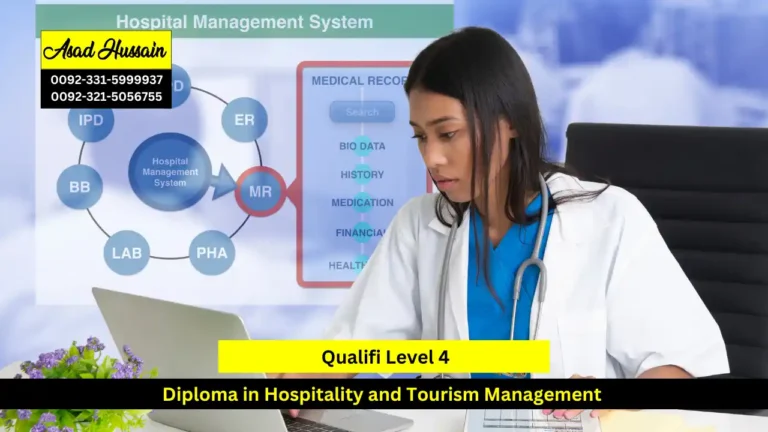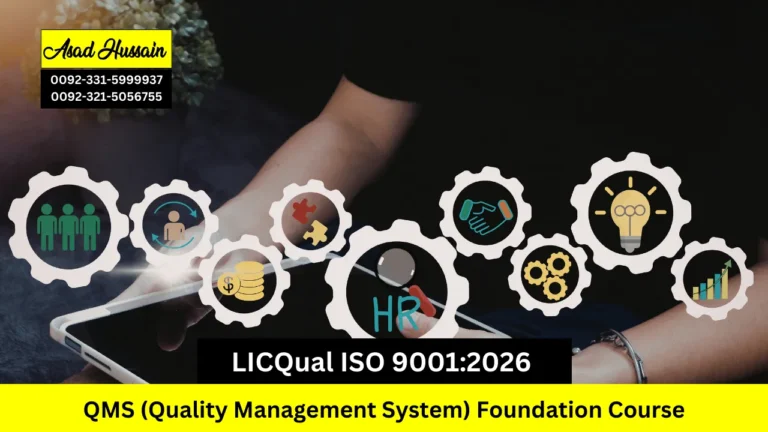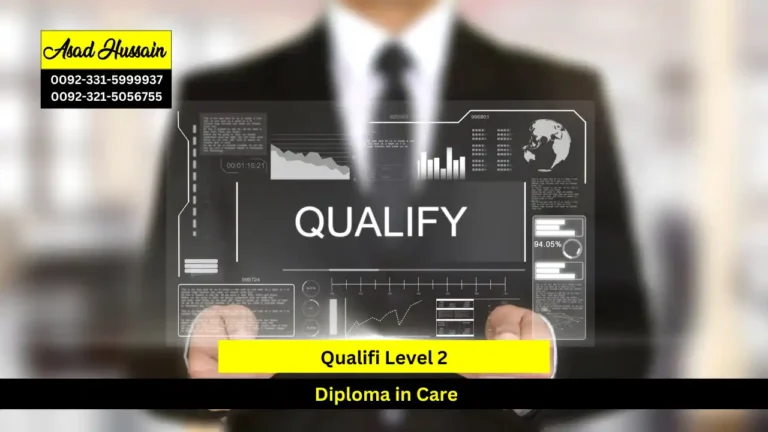The LICQual Level 7 Postgraduate Diploma in Health Policy and Management is a globally recognized qualification designed for healthcare professionals, administrators, and policymakers seeking to shape the future of health systems through effective policy design, strategic management, and evidence-based decision-making. In a world where healthcare delivery faces complex global challenges, this advanced diploma empowers learners with the analytical, leadership, and managerial skills necessary to transform healthcare organizations and public health outcomes.
LICQual Level 7 Postgraduate Diploma in Health Policy and Management provides an in-depth understanding of healthcare governance, financing, and policy frameworks that influence national and international health systems. Learners explore how effective policy implementation can improve equity, efficiency, and sustainability across healthcare organizations. The course emphasizes the integration of management principles with policy analysis, preparing graduates to lead reforms and drive innovation in healthcare delivery and public health strategy.
Through this LICQual Level 7 Diploma in Health Policy and Management, participants gain practical skills in policy formulation, health economics, resource allocation, and strategic leadership. The program blends theoretical foundations with real-world applications, ensuring learners can analyze healthcare systems, manage teams, and design solutions that address pressing healthcare challenges such as accessibility, cost-efficiency, and quality of care.
Program Highlights
Mandatory Units
- Global Health Policy and Governance
- Strategic Health Policy Development and Implementation
- Healthcare Leadership and Management in Policy
- Economics of Health Policy and Financing
- Research Methods in Health Policy and Management
- Ethical, Legal, and Social Dimensions of Health Policy
The LICQual Level 7 Postgraduate Diploma in Health Policy and Management is designed for ambitious professionals and graduates who aspire to play a key role in shaping healthcare systems, developing evidence-based policies, and managing health organizations effectively. To ensure that all learners can successfully engage with the advanced concepts and professional practices of this program, specific entry requirements must be met in terms of age, education, work experience, and language proficiency.
Age Requirements
• Learners must be at least 21 years of age or older at the time of enrollment.
• Mature candidates with substantial professional experience but without formal academic qualifications may also be considered through the Recognition of Prior Learning (RPL) process.
Educational Requirements
• Applicants should hold a recognized Bachelor’s degree in Healthcare Management, Public Health, Health Sciences, Business Administration, or a related discipline.
• Candidates with equivalent qualifications or professional certifications in health management, policy, or administration may also be accepted.
Professional Experience
• A minimum of two years of relevant work experience in healthcare management, public health, or health policy-related roles is required.
• Professionals with experience in leadership, administration, or policy formulation within healthcare organizations are particularly encouraged to apply.
English Language Proficiency
• Non-native English speakers must demonstrate English proficiency through an IELTS score of at least 6.0 or an equivalent qualification.
• Alternatively, applicants may provide evidence of prior academic study or professional work conducted in English.
The LICQual Level 6 Diploma in Healthcare Management is a recommended pathway, offering the essential knowledge and managerial foundation for progression into this advanced program.
The LICQual Level 7 Postgraduate Diploma in Health Policy and Management is designed to equip learners with advanced knowledge, strategic insight, and leadership skills necessary to shape and manage modern healthcare systems effectively. Upon completion of the program, learners will develop a deep understanding of global health policy frameworks, governance structures, economic principles, and ethical considerations influencing decision-making in healthcare management. The following learning outcomes are aligned with international academic and professional standards, ensuring learners gain measurable and applicable competencies for real-world practice.
Global Health Policy and Governance
• Demonstrate a critical understanding of global health systems, international health policies, and governance models that shape public health outcomes.
• Evaluate the role of global organizations such as WHO, UN, and World Bank in influencing international health agendas.
• Analyze cross-border health challenges and propose evidence-based policy responses for effective governance.
• Apply policy analysis tools to assess the impact of global health initiatives on national and regional health systems.
• Formulate recommendations to strengthen global cooperation, policy alignment, and equitable healthcare access.
Strategic Health Policy Development and Implementation
• Understand the processes involved in designing, developing, and implementing effective health policies at national and organizational levels.
• Evaluate policy-making models and their relevance in addressing current healthcare challenges and reforms.
• Apply strategic management techniques to monitor, review, and enhance health policy performance and outcomes.
• Develop skills to engage stakeholders, conduct policy analysis, and ensure sustainable health system transformation.
• Integrate data-driven approaches in planning and evaluating health policies for evidence-based decision-making.
Healthcare Leadership and Management in Policy
• Demonstrate leadership competencies required for managing healthcare organizations and influencing policy environments.
• Assess the impact of leadership styles on healthcare governance, staff motivation, and policy execution.
• Apply strategic leadership and change management principles to promote policy innovation and organizational improvement.
• Develop communication and negotiation skills to lead interdisciplinary teams in policy development and advocacy.
• Critically evaluate leadership challenges in healthcare management and propose effective policy-oriented solutions.
Economics of Health Policy and Financing
• Explain the economic principles underpinning health policy formulation, financing mechanisms, and resource allocation.
• Analyze healthcare financing models, cost-effectiveness strategies, and budgetary processes in policy contexts.
• Evaluate the economic implications of healthcare policies on equity, efficiency, and access to care.
• Apply economic evaluation tools to assess policy impact, funding sustainability, and healthcare system performance.
• Develop strategies for optimizing resource utilization and financial management within health policy frameworks.
Research Methods in Health Policy and Management
• Understand advanced research methodologies applicable to health policy and management studies.
• Design and conduct independent research projects to address emerging challenges in health policy and healthcare delivery.
• Apply qualitative and quantitative methods to collect, analyze, and interpret health policy data.
• Critically review academic literature to identify trends, innovations, and gaps in global health policy research.
• Present research findings effectively using appropriate academic and professional reporting standards.
Ethical, Legal, and Social Dimensions of Health Policy
• Identify and evaluate ethical, legal, and social issues affecting health policy formulation and implementation.
• Apply ethical frameworks and legal principles to ensure fairness, transparency, and accountability in policy decisions.
• Examine the impact of social determinants of health on policy development and public health equity.
• Analyze case studies to assess the ethical and legal implications of global and national health policies.
• Promote ethical leadership and advocacy for patient rights, social justice, and sustainable healthcare practices.
The LICQual Level 7 Postgraduate Diploma in Health Policy and Management, learners will possess the advanced analytical, strategic, and leadership skills needed to influence policy decisions and drive positive transformation in healthcare systems. They will be well-prepared for senior roles in health policy formulation, healthcare governance, and strategic management across international, governmental, and private sector organizations.
The LICQual Level 7 Postgraduate Diploma in Health Policy and Management is a globally recognized qualification designed for healthcare professionals, administrators, policy makers, and public health specialists who aspire to lead strategic initiatives and shape effective healthcare systems. In today’s rapidly evolving healthcare landscape, this qualification empowers learners to develop evidence-based policies, manage healthcare resources efficiently, and implement innovative strategies that improve population health outcomes. The program focuses on equipping professionals with advanced knowledge, analytical tools, and practical techniques to design, implement, and evaluate health policies aligned with international standards and governance frameworks.
Healthcare Leaders and Managers
• Professionals currently in or aspiring to leadership roles within hospitals, clinics, and healthcare organizations.
• Managers responsible for developing and implementing health policies and management strategies.
• Individuals aiming to strengthen their leadership and decision-making capabilities in healthcare administration and policy implementation.
• Leaders focused on improving organizational performance, patient outcomes, and policy compliance.
• Administrators striving to build resilient healthcare systems that promote equitable access and effective governance.
Healthcare Professionals and Practitioners
• Doctors, nurses, and allied health professionals committed to understanding and applying health policy in clinical and administrative settings.
• Practitioners seeking to influence healthcare delivery through evidence-based decision-making and strategic planning.
• Professionals aiming to uphold patient safety, regulatory compliance, and operational excellence through policy interventions.
• Clinicians focused on integrating policy frameworks into service delivery, resource allocation, and quality improvement initiatives.
• Learners aspiring to enhance practical competence in healthcare management and policy evaluation.
Policy Makers and Administrators
• Policy makers and administrators engaged in formulating health policies and sustainable governance frameworks.
• Professionals responsible for integrating regulatory, ethical, and strategic considerations into healthcare strategies.
• Individuals overseeing healthcare compliance, auditing, and policy implementation within organizations.
• Administrators managing departments related to health planning, risk assessment, and resource utilization.
• Leaders committed to advancing governance, compliance, and reforms in healthcare institutions.
Supervisors and Departmental Heads
• Supervisors overseeing healthcare operations to ensure adherence to policy and regulatory requirements.
• Departmental heads responsible for implementing policy initiatives, performance audits, and quality improvement programs.
• Professionals coordinating policy-related activities and ensuring alignment with national and international standards.
• Managers conducting training, evaluations, and simulations to promote operational efficiency and staff competence.
• Leaders fostering a culture of accountability, innovation, and continuous improvement across healthcare departments.
Career-Focused Learners and Future Health Policy Leaders
• Individuals aspiring to build careers in healthcare policy, public health management, or health administration.
• Learners preparing for leadership positions focused on policy development, strategic planning, and healthcare reform.
• Professionals aiming to progress in roles related to governance, regulatory compliance, or healthcare strategy.
• Career-driven individuals motivated to apply global best practices in policy and health system management.
• Learners seeking to become influential leaders capable of transforming healthcare organizations through evidence-based policy and strategic management.
The LICQual Level 7 Postgraduate Diploma in Health Policy and Management is ideal for professionals committed to enhancing healthcare governance, policy development, and operational excellence. Graduates will gain the expertise to design, implement, and lead health policies and management frameworks that align with international standards. This qualification opens doors to senior roles in healthcare administration, public health strategy, and policy leadership — empowering professionals to drive reforms that improve population health, ensure compliance, and advance sustainable healthcare systems worldwide.







